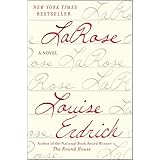In her new novel, "LaRose," released a couple of weeks ago, Erdrich returns to North Dakota where another tragedy decimates a family, pointing to the vast differences between tribal justice and state laws. In the book's shocking opening scene, tribal member Landreaux Iron aims steadily at a deer on the edge of the property line that separates his land from that of his wife's half-sister, Nola and her husband, Peter. But as the deer flees, a small body crumples to the ground. Landreaux has killed a little boy, his son Larose's best friend, Dusty.
Though eventually cleared of legal wrong doing by the police, Landreaux's burden of guilt invades his entire being, affecting his relationships in town and in his family, especially with his wife Emmaline. Seeking the spiritual solace of his ancestors, Landreaux approaches Emmaline asking the impossible. They must give their beautiful boy, LaRose, to Peter and Nola, for them to raise as their own child. This is the tribal way.
It may seem outrageous to readers and yet, in her research, Erdrich found that this was in fact a means of atonement in other cultures too. What is so unforgivable is that the boy, LaRose, is not really told why his family is basically giving him away. Yet, when he moves in with Nola and Peter, he intuits that he is there for an important reason, and with a knowledge way beyond his years, he accepts his situation and vows to be all that Nola needs to help her through her grief.
Grief is at the heart of this novel, depicted so beautifully, that all-encompassing inability to find joy in life or in the love and support of family. Nola is debilitated to the point where her older daughter Maggie, also devastated at the loss of her brother, joins forces with LaRose in a pact to watch over and care for their mother, to keep her from the ultimate act of a woman without hope.
And what, you might ask, of Emmaline? What can she be thinking, seeing her own last born child being raised by another woman, running into her son in the store, feverish with desire to hold and squeeze him to her breast, yet unable? What hatred and resentment does she nurture as she lies next to her husband at night, unable to feel anything after the loss of her boy?
And what of the fathers? Peter? Is he less of a man because he cannot bring himself to kill Landreaux in an act of vengeance? Might it have been easier on everyone if Landreaux had been found guilty of a crime? Perhaps he was drunk? After all, he was an alcoholic at one time.
This novel is agonizing to read and yet Ms. Erdrich injects just enough backstory, dollops of humor, and, as is her style, a native myth tracing the LaRose name back through generations, attached to both male and female characters gifted in the healing arts. In this way she miraculously weaves a thread that will eventually stitch these two families into a semblance of one. It's a tale of power, redemption, reconciliation, and love, feelings sorely needed in today's world. A magical read.


1 comment:
Wow! Now I know why Barb is considering this one for her October discussion choice.
Post a Comment